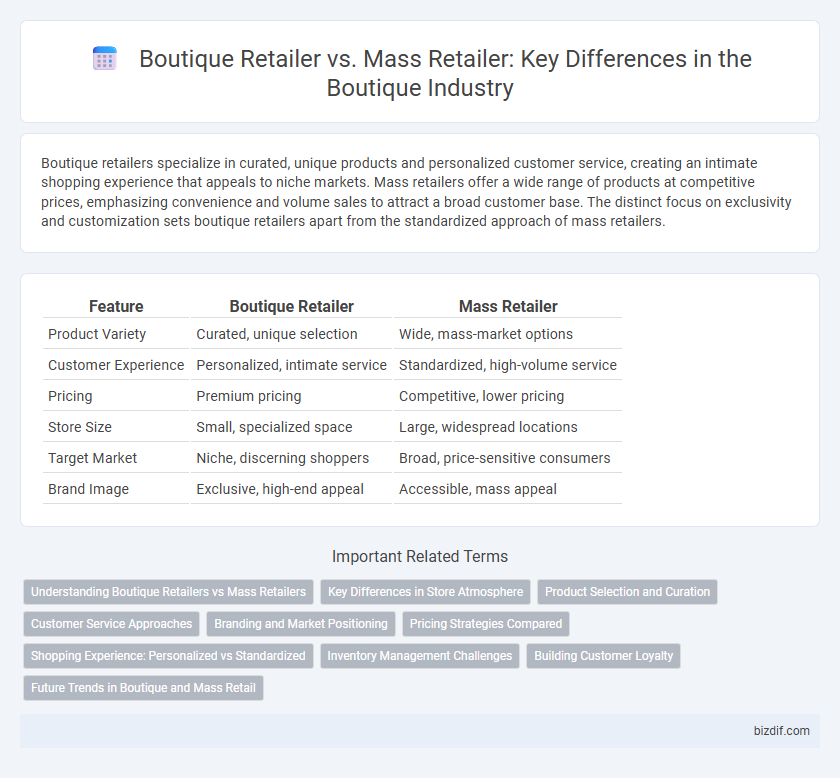Boutique retailers specialize in curated, unique products and personalized customer service, creating an intimate shopping experience that appeals to niche markets. Mass retailers offer a wide range of products at competitive prices, emphasizing convenience and volume sales to attract a broad customer base. The distinct focus on exclusivity and customization sets boutique retailers apart from the standardized approach of mass retailers.
Table of Comparison
| Feature | Boutique Retailer | Mass Retailer |
|---|---|---|
| Product Variety | Curated, unique selection | Wide, mass-market options |
| Customer Experience | Personalized, intimate service | Standardized, high-volume service |
| Pricing | Premium pricing | Competitive, lower pricing |
| Store Size | Small, specialized space | Large, widespread locations |
| Target Market | Niche, discerning shoppers | Broad, price-sensitive consumers |
| Brand Image | Exclusive, high-end appeal | Accessible, mass appeal |
Understanding Boutique Retailers vs Mass Retailers
Boutique retailers specialize in offering unique, high-quality products with personalized customer service, catering to niche markets and emphasizing exclusivity. Mass retailers prioritize large-scale operations, providing a wide range of affordable products aimed at mass-market appeal with standardized shopping experiences. Understanding these differences helps businesses target customer segments effectively and aligns marketing strategies with consumer preferences.
Key Differences in Store Atmosphere
Boutique retailers create an intimate, personalized shopping experience with carefully curated product selections and unique store designs that emphasize exclusivity and style. In contrast, mass retailers offer a more utilitarian store atmosphere, prioritizing wide product variety, high-volume sales, and convenience. The boutique environment fosters customer loyalty through tailored service and distinctive ambiance, while mass retailers focus on efficiency and broad accessibility.
Product Selection and Curation
Boutique retailers offer a carefully curated selection of unique, high-quality products tailored to niche markets, emphasizing exclusivity and personalized shopping experiences. In contrast, mass retailers prioritize a broad, diverse inventory designed to appeal to a wide audience with standardized, high-volume items. This focused curation by boutiques enhances product differentiation, driving customer loyalty through specialized offerings not typically found in mass retail environments.
Customer Service Approaches
Boutique retailers prioritize personalized customer service by offering tailored product recommendations and attentive in-store experiences that cater to individual preferences. Mass retailers implement standardized customer service protocols aimed at efficiency, often utilizing self-service options and automated systems to handle large volumes of customers. The boutique approach fosters stronger customer relationships, while mass retailers emphasize scalability and convenience.
Branding and Market Positioning
Boutique retailers emphasize exclusive, high-quality products and personalized customer experiences, fostering strong brand loyalty and a distinct market identity. Mass retailers focus on wide product availability and competitive pricing, targeting a broad audience with less personalized branding. Boutique branding leverages niche market positioning to create unique value, while mass retailers position themselves as accessible and convenient shopping destinations.
Pricing Strategies Compared
Boutique retailers implement premium pricing strategies by offering unique, high-quality products and personalized service, appealing to niche markets willing to pay higher prices. Mass retailers adopt competitive pricing, leveraging economies of scale and bulk purchasing to provide lower prices and attract a broader customer base. These distinct approaches reflect the boutique focus on exclusivity versus the mass retailer emphasis on affordability and volume sales.
Shopping Experience: Personalized vs Standardized
Boutique retailers offer a personalized shopping experience featuring tailored customer service, unique product selections, and intimate store environments, which foster strong customer relationships and brand loyalty. In contrast, mass retailers provide a standardized shopping experience with broad product assortments, efficient transactions, and consistent store layouts designed for high volume and convenience. This distinction highlights how boutiques emphasize customization and exclusivity while mass retailers focus on availability and uniformity.
Inventory Management Challenges
Boutique retailers face inventory management challenges due to limited stock variety and smaller order quantities, requiring precise demand forecasting to avoid overstocking or stockouts. Mass retailers manage vast SKUs and high turnover rates, demanding sophisticated inventory systems for efficient replenishment and space optimization. Inventory accuracy and flexibility are critical for boutiques to maintain exclusivity, while mass retailers prioritize scalability and supply chain integration.
Building Customer Loyalty
Boutique retailers build customer loyalty by offering personalized shopping experiences, unique product selections, and exceptional customer service tailored to niche markets. Mass retailers rely on competitive pricing, wide product variety, and convenience to attract a broad customer base but often lack the individualized attention that fosters deep loyalty. The boutique approach creates emotional connections and repeat business through curated offerings and attentive service, enhancing long-term customer retention.
Future Trends in Boutique and Mass Retail
Future trends in boutique retail emphasize personalized customer experiences, leveraging advanced AI-driven analytics to tailor product offerings and enhance in-store engagement, contrasting with mass retailers' increased focus on automation and supply chain efficiency to handle large-scale inventory. Boutiques are adopting immersive technologies such as augmented reality to create unique shopping environments, while mass retailers are investing in omnichannel strategies, integrating online and offline channels to streamline consumer access and convenience. The rise of sustainability and ethical sourcing is influencing both sectors, with boutiques prioritizing artisanal and locally sourced products, and mass retailers scaling eco-friendly practices across global supply chains.
Boutique Retailer vs Mass Retailer Infographic

 bizdif.com
bizdif.com